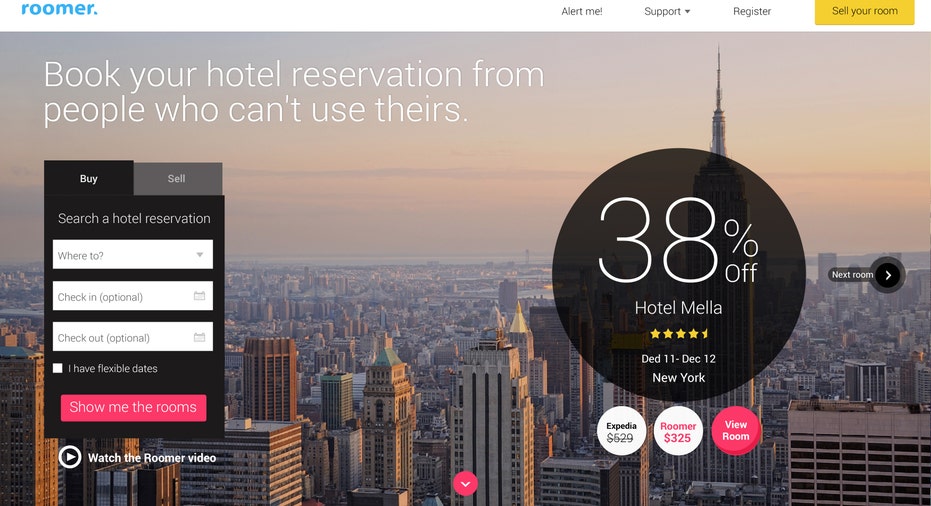Startup Lets Travelers Sell Last-Minute Hotel Cancellations

Ever need to cancel travel plans last minute, and get stuck paying for a nonrefundable hotel room? Startup Roomer wants to help travelers get some money back when plans change post booking.
The Israeli startup launched in beta earlier this year in New York, San Francisco and Las Vegas, and last month expanded nationwide. The site functions like a “StubHub” for the travel industry.
“Our business model is all about good karma,” U.S. Managing Director Richie Karaburun says. “Roomer is the first-ever company to provide a solution for nonrefundable hotel room cancellations and does so in a way that is both helpful and trustworthy to all parties affected by these cancellations.”
Roomer is partnered with more than 2,000 boutique and larger hotel chains including Belvedere New York and InnSuites Hospitality, and offers over 1,200 rooms and suites in California and the Southwest U.S. According to Karaburun, the site has thousands of users, and the number is increasing daily as the company expands in the U.S. and globally. This week, the company is one of the featured “Innovators” at the Travel Innovations Summit part of the PhoCus Wright Conference in Florida.
“As we are relatively new, every day is exciting for us,” Karaburun says. “We [want] our customers to use and take advantage of our model and our hotel partners to appreciate our […] proposition.”
The idea for Roomer came to co-founder and CEO Gon Ben David after a personal travel fiasco: an unforeseen natural disaster prevented him from making a trip to visit his girlfriend in New York and he was left with a pricey hotel reservation he couldn’t make, or cancel without significant fees.
Enter Roomer. The online marketplace lets travelers sell nonrefundable reservations at a discount. The site uses an automated validation system to make sure reservations are authentic before buyers can purchase, and after a transaction is complete, Roomer transfers the reservation into the new traveler’s name. Hotel rooms available on Roomer are on average 47% to 50% off the original price, with Roomer collecting 15% commission on each sale.
Michael Kwon, a Roomer user, found Roomer through a Google search. Kwon and his girlfriend had planned a trip to Disneyland, but an unexpected work conflict forced them to cancel. Kwon, who uses Stubhub for sporting events as well as Airbnb, says he would recommend Roomer to friends “before booking anything” as “the hotel they want might be available at a steep discount.”
The company raised $2 million in funding from the BRM Group, and Uri Levine, co-founder of Google’s recent $1 billion acquisition Waze, sits on the board.
But not all analysts think Roomer is a sure bet.
Henry Harteveldt, travel industry strategist at Hudson Crossing, thinks Roomer is “fraught with risk.”
“They are overestimating the market value,” Harteveldt says. “I’ve seen figures of $2.5 million to $10 million bandied and based on conversations I’ve had with hotels, no one is able to come up with anything like that.”
He says what Roomer is trying to do – give consumers the opportunity to resell a reservation that is past its cancellation timeline – is counter to the best interest of hotels, and is a problem that doesn’t exist.
Harteveldt, too, compares Roomer to StubHub, but says where StubHub deals with tickets that have no cancellation penalties, a room reservation is a reservation, and as a consumer, when you book a room, you’ve agreed to the terms of the reservation – penalties and all. He adds there are other cost-effective, creative tools for hotels to use that help them solve this issue such as Guestmob and Hotel Tonight.
“This is a solution in search of a problem,” he says. “There aren’t that many rooms or reservations where this is going to be a problem.”
Still, Bob Offut, PhoCus Wright senior tech analyst, says Roomer made it through the event’s rigorous application process, and demonstrated a “unique product offer and concept” and showed “innovation in both business and technology.”
Offut also says to get on stage at the conference, at which Roomer is competing for a large funding prize, is a long process, and “just because you have money it won’t get you on stage.”
As for Karaburun, prize or not, he is excited for Roomer’s early success and is hopeful the name will become as popular a verb as Google: “If you cannot make your trip, Roomer it!”



















